Anpassungsfähigkeit und Resilienz des Finanzsystems
Diese Forschungsgruppe untersucht kritische Aspekte der Anpassungsfähigkeit und Widerstandsfähigkeit von Finanzsystemen. Sie analysiert die Auswirkungen von Naturkatastrophen auf Finanzsysteme, die Auswirkungen politischer Präferenzen für die grüne Transformation und die Bedeutung von Kultur in den Volkswirtschaften.
Forschungscluster
Finanzresilienz und RegulierungIhr Kontakt

Mitglied - Abteilung Finanzmärkte
PROJEKTE
07.2016 ‐ 12.2018
Relationship Lenders and Unorthodox Monetary Policy: Investment, Employment, and Resource Reallocation Effects
Leibniz-Gemeinschaft
We combine a number of unique and proprietary data sources to measure the impact of relationship lenders and unconventional monetary policy during and after the European sovereign debt crisis on the real economy. Establishing systematic links between different research data centers (Forschungsdatenzentren, FDZ) and central banks with detailed micro-level information on both financial and real activity is the stand-alone proposition of our proposal. The main objective is to permit the identification of causal effects, or their absence, regarding which policies were conducive to mitigate financial shocks and stimulate real economic activities, such as employment, investment, or the closure of plants.
01.2015 ‐ 12.2019
Interactions between Bank-specific Risk and Macroeconomic Performance
Deutsche Forschungsgemeinschaft (DFG)
Referierte Publikationen

Productivity, Managers’ Social Connections and the Financial Crisis
in: Journal of Banking and Finance, August 2022
Abstract
This paper investigates whether managers’ personal connections help corporate productivity to recover after a negative economic shock. Leveraging the heterogeneity in the severity of the financial crisis across different sectors, the paper reports that (i) the financial crisis had a negative effect on within-firm productivity, (ii) the effect was long-lasting and persistent, supporting a productivity-hysteresis hypothesis, and (iii) managers’ personal connections allowed corporations to recover from this productivity slowdown. Among the possible mechanisms, we show that connected managers operating in affected sectors foster productivity recovery through higher input cost efficiency and better access to the credit market, as well as more efficient use of labour and capital.
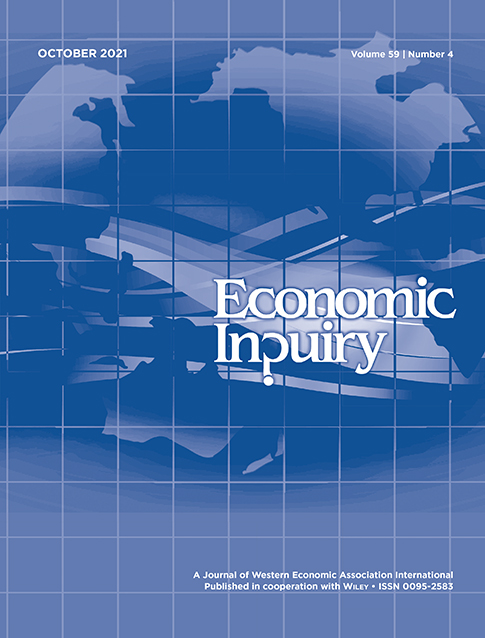
The Cleansing Effect of Banking Crises
in: Economic Inquiry, Nr. 3, 2022
Abstract
We assess the cleansing effects of the 2008–2009 financial crisis. U.S. regions with higher levels of supervisory forbearance on distressed banks see less restructuring in the real sector: fewer establishments, firms, and jobs are lost when more distressed banks remain in business. In these regions, the banking sector has been less healthy for several years after the crisis. Regions with less forbearance experience higher productivity growth after the crisis with more firm entries, job creation, and employment, wages, patents, and output growth. Forbearance is greater for state-chartered banks and in regions with weaker banking competition and more independent banks.
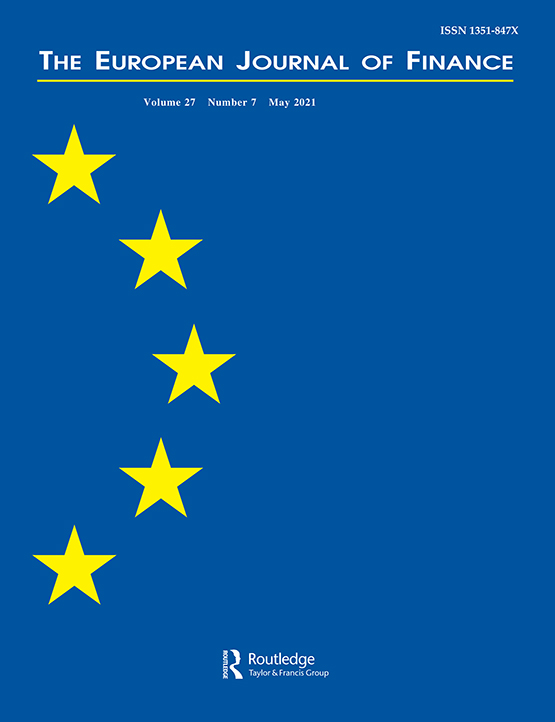
Firm Social Networks, Trust, and Security Issuances
in: European Journal of Finance, Nr. 4, 2022
Abstract
We observe that public firms are more likely to issue seasoned stocks rather than bonds when theirs boards are more socially-connected. These connected issuers experience better announcement-period stock returns and attract more institutional investors. This social-connection effect is stronger for firms with severe information asymmetry, higher risk of being undersubscribed, and more visible to investors. Our conjecture is this social-network effect is driven by trust in issuing firms. Given stocks are more sensitive to trust, these trusted firms are more likely to issue stocks than bonds. Trustworthiness plays an important role in firms’ security issuances in capital markets.

Social Capital, Trusting, and Trustworthiness: Evidence from Peer-to-Peer Lending
in: Journal of Financial and Quantitative Analysis, Nr. 4, 2022
Abstract
How does social capital affect trust? Evidence from a Chinese peer-to-peer lending platform shows regional social capital affects the trustee’s trustworthiness and the trustor’s trust propensity. Ceteris paribus, borrowers from higher social capital regions receive larger bid from individual lenders, have higher funding success, larger loan size, and lower default rates, especially for low-quality borrowers. Lenders from higher social capital regions take higher risks and have higher default rates, especially for inexperienced lenders. Cross-regional transactions are most (least) likely to be realized between parties from high (low) social capital regions.

Political Ties and Raising Capital in Global Markets: Evidence from Yankee Bonds
in: Journal of Corporate Finance, June 2022
Abstract
This paper examines whether state-to-state political ties help firms obtain better terms when raising funds in global capital markets. Focusing on the Yankee bonds market, we find that issuances by firms from countries with close political ties with the US feature lower yield spreads, higher issuance amounts, and longer maturities. Such an association is more pronounced for firms located in low income and highly indebted countries as well as firms in government-related industries, first-time issuers, and relatively smaller firms. Our study provides evidence supporting the notion that country-level political relationship is an important factor when raising capital in international markets.
Arbeitspapiere
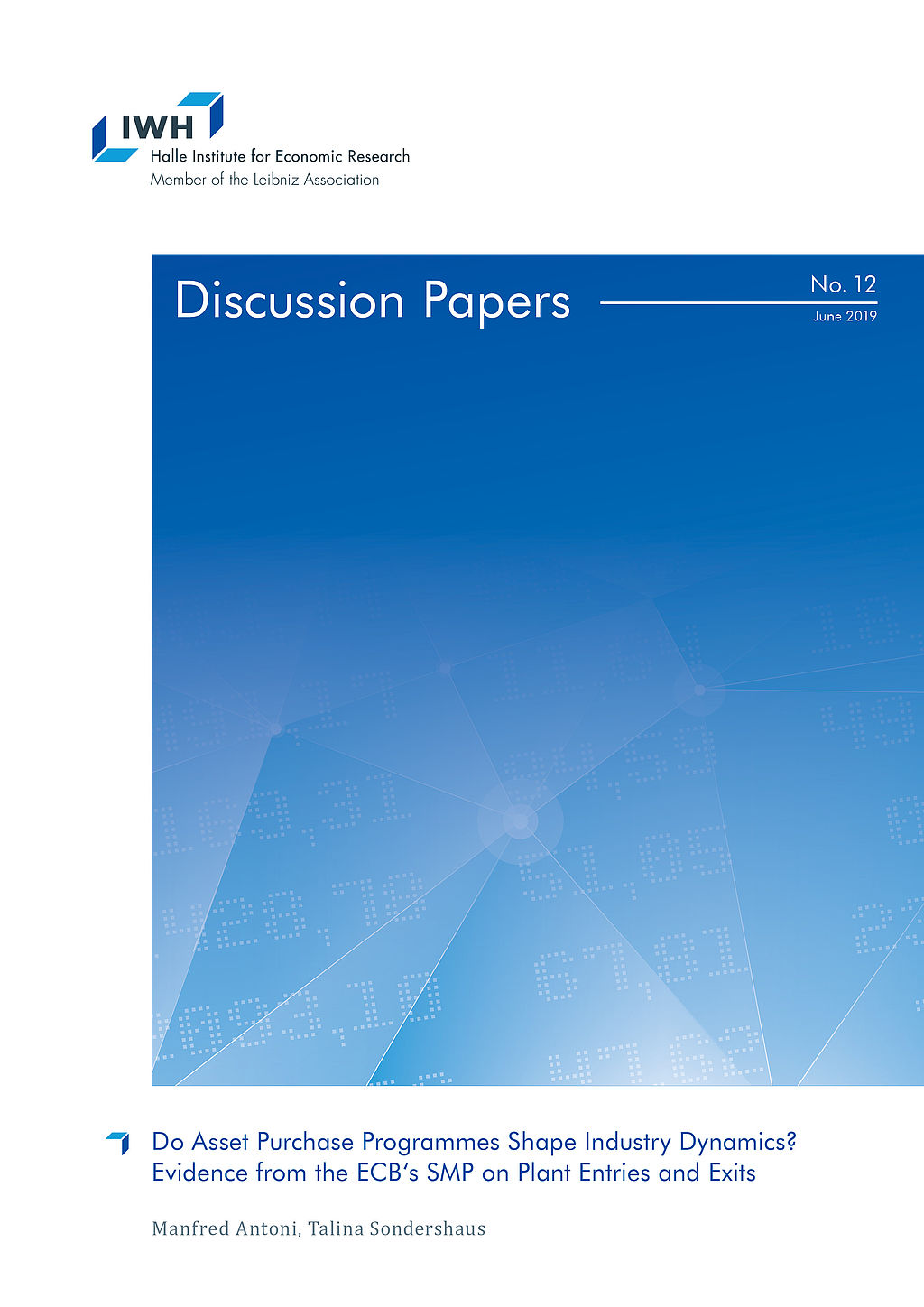
Do Asset Purchase Programmes Shape Industry Dynamics? Evidence from the ECB's SMP on Plant Entries and Exits
in: IWH Discussion Papers, Nr. 12, 2019
Abstract
Asset purchase programmes (APPs) may insulate banks from having to terminate relationships with unproductive customers. Using administrative plant and bank data, we test whether APPs impinge on industry dynamics in terms of plant entry and exit. Plants in Germany connected to banks with access to an APP are approximately 20% less likely to exit. In particular, unproductive plants connected to weak banks with APP access are less likely to close. Aggregate entry and exit rates in regional markets with high APP exposures are also lower. Thus, APPs seem to subdue Schumpeterian cleansing mechanisms, which may hamper factor reallocation and aggregate productivity growth.
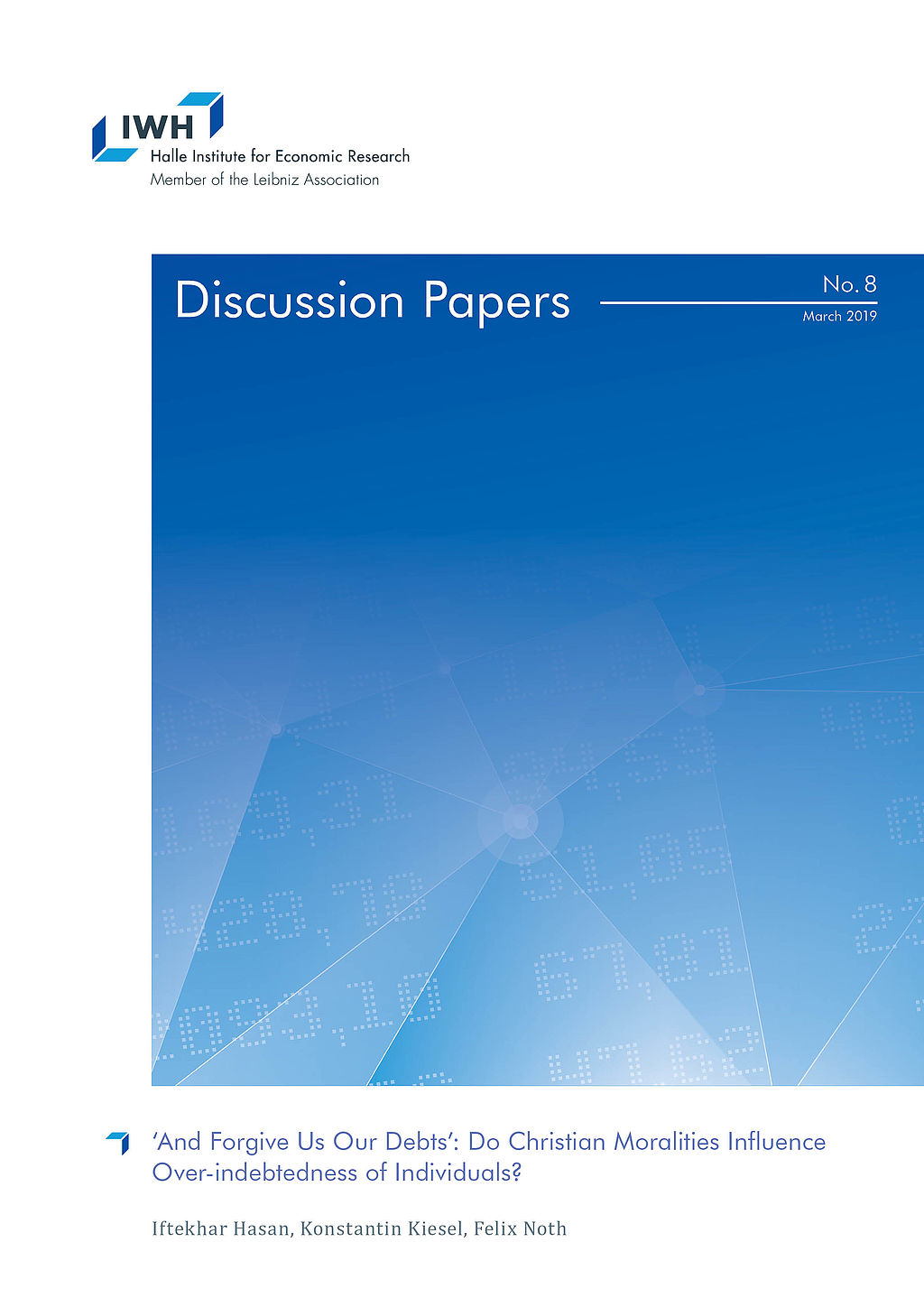
‘And Forgive Us Our Debts’: Do Christian Moralities Influence Over-indebtedness of Individuals?
in: IWH Discussion Papers, Nr. 8, 2019
Abstract
This paper analyses whether Christian moralities and rules formed differently by Catholics and Protestants impact the likelihood of households to become overindebted. We find that over-indebtedness is lower in regions in which Catholics outweigh Protestants, indicating that Catholics‘ forgiveness culture and a stricter enforcement of rules by Protestants serve as explanations for our results. Our results provide evidence that religion affects the financial situations of individuals and show that even 500 years after the split between Catholics and Protestants, the differences in the mind-sets of both denominations play an important role for situations of severe financial conditions.
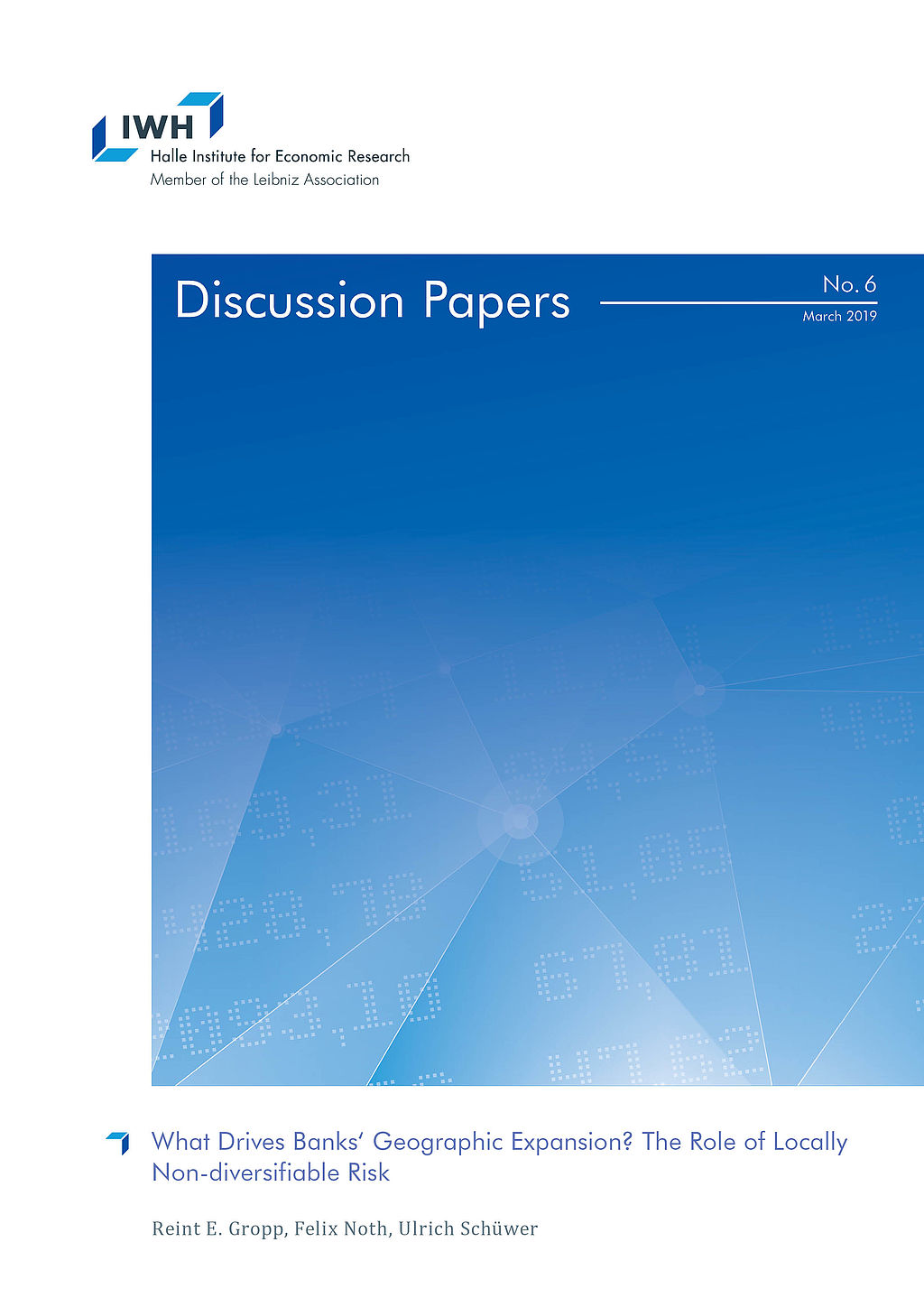
What Drives Banks‘ Geographic Expansion? The Role of Locally Non-diversifiable Risk
in: IWH Discussion Papers, Nr. 6, 2019
Abstract
We show that banks that are facing relatively high locally non-diversifiable risks in their home region expand more across states than banks that do not face such risks following branching deregulation in the 1990s and 2000s. These banks with high locally non-diversifiable risks also benefit relatively more from deregulation in terms of higher bank stability. Further, these banks expand more into counties where risks are relatively high and positively correlated with risks in their home region, suggesting that they do not only diversify but also build on their expertise in local risks when they expand into new regions.
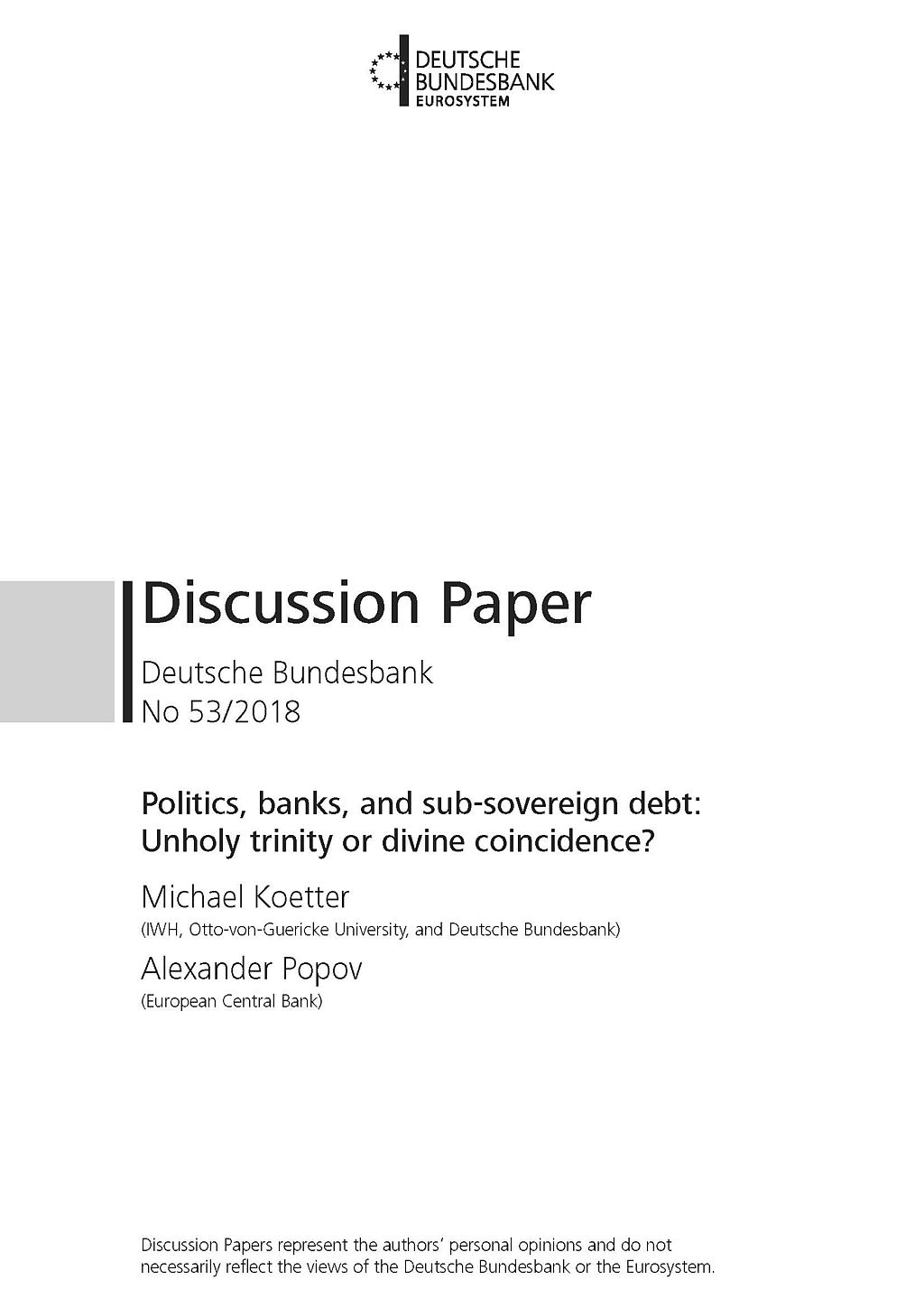
Politics, Banks, and Sub-sovereign Debt: Unholy Trinity or Divine Coincidence?
in: Deutsche Bundesbank Discussion Paper, Nr. 53, 2018
Abstract
We exploit election-driven turnover in State and local governments in Germany to study how banks adjust their securities portfolios in response to the loss of political connections. We find that local savings banks, which are owned by their host county and supervised by local politicians, increase significantly their holdings of home-State sovereign bonds when the local government and the State government are dominated by different political parties. Banks' holdings of other securities, like federal bonds, bonds issued by other States, or stocks, are not affected by election outcomes. We argue that banks use sub-sovereign bond purchases to gain access to politically distant government authorities.

May the Force Be with You: Exit Barriers, Governance Shocks, and Profitability Sclerosis in Banking
in: Deutsche Bundesbank Discussion Paper, Nr. 49, 2018
Abstract
We test whether limited market discipline imposes exit barriers and poor profitability in banking. We exploit an exogenous shock to the governance of government-owned banks: the unification of counties. County mergers lead to enforced government-owned bank mergers. We compare forced to voluntary bank exits and show that the former cause better bank profitability and efficiency at the expense of riskier financial profiles. Regarding real effects, firms exposed to forced bank mergers borrow more at lower cost, increase investment, and exhibit higher employment. Thus, reduced exit frictions in banking seem to unleash the economic potential of both banks and firms.


















